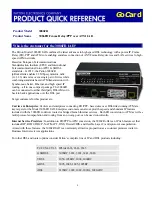
AT-GS950/24 Web Interface User Guide
343
Associating VLANs to MSTIs
When you are using Multiple Spanning Tree, Allied Telesis recommends that
you assign each VLANs to one of the existing MSTIs on a switch. You should
not leave any VLAN unassigned including the Default VLAN. This is to prevent
the blocking of a port that should be in the forwarding state. The reason for
this guideline is explained below.
An MSTP BPDU contains information identifying the Multiple Spanning Tree
instance that is associated with the port transmitting the BPDU packet. By
default, all ports of the AT-GS950/24 switch belong to the CIST instance. So
the CIST identification is always included in the BPDU. If the port is also a
member of a VLAN that has been assigned to a MSTI, that information is
included in the BPDU too.
This is illustrated in Figure 122. Port 1 in switch A is a member of the Default
VLAN and has been assigned to MSTI ID 10 and port 8 is a member of VLAN
3 assigned to MSTI ID 10. The BPDUs transmitted by port 8 to switch B
indicate that the port is a member of both CIST 0 and MSTI 15, while the
BPDUs from port 1 indicate the port is a member of the CIST 0 and MSTI 10.
Figure 122. CIST and VLAN Guideline - Example 1
At first glance, it might appear that because both ports belong to CIST, a loop
would exist between the switches and that MSTP would block a port to stop
the loop. However, within a region, MSTI takes precedence over CIST. When
switch B receives a packet from switch A, it uses MSTI, not CIST, to determine
whether a loop exists. And because both ports on switch A belong to different
MSTIs, switch B determines that no loop exists.
A problem can arise, however, if you assign some VLANs to MSTIs while
leaving others assigned only to CIST. Figure 123 on page 344 illustrates the
issue. The network is the similar as the previous example. The primary
difference is that the VLAN 2 containing port 1 on Switch A has not been
assigned to a MSTI, and only belongs to CIST (MSTI ID 0).
Summary of Contents for AT-GS950/24
Page 12: ...Figures 12 ...
Page 14: ...List of Tables 14 ...
Page 18: ...Preface 18 ...
Page 60: ...Chapter 2 Basic Switch Configuration 60 ...
Page 68: ...Chapter 3 Port Configuration 68 ...
Page 74: ...Chapter 4 Port Mirroring 74 ...
Page 94: ...Chapter 5 Virtual LANs 94 ...
Page 102: ...Chapter 6 GVRP 102 ...
Page 132: ...Chapter 8 STP and RSTP 132 ...
Page 146: ...Chapter 9 Multiple Spanning Tree Protocol 146 ...
Page 156: ...Chapter 10 Static Port Trunking 156 ...
Page 178: ...Chapter 12 Quality of Service CoS 178 ...
Page 206: ...Chapter 13 Access Control Configuration 206 ...
Page 226: ...Chapter 15 MAC Address Table 226 ...
Page 238: ...Chapter 16 DHCP Snooping 238 ...
Page 244: ...Chapter 17 IGMP Snooping 244 ...
Page 288: ...Chapter 21 Simple Network Management Protocol SNMPv3 288 ...
Page 300: ...Chapter 22 RMON 300 ...
Page 322: ...Chapter 24 Management Software Updates 322 ...
Page 348: ...Appendix A MSTP Overview 348 ...
Page 366: ...Appendix A AT GS950 24 Default Parameters 366 ...
















































